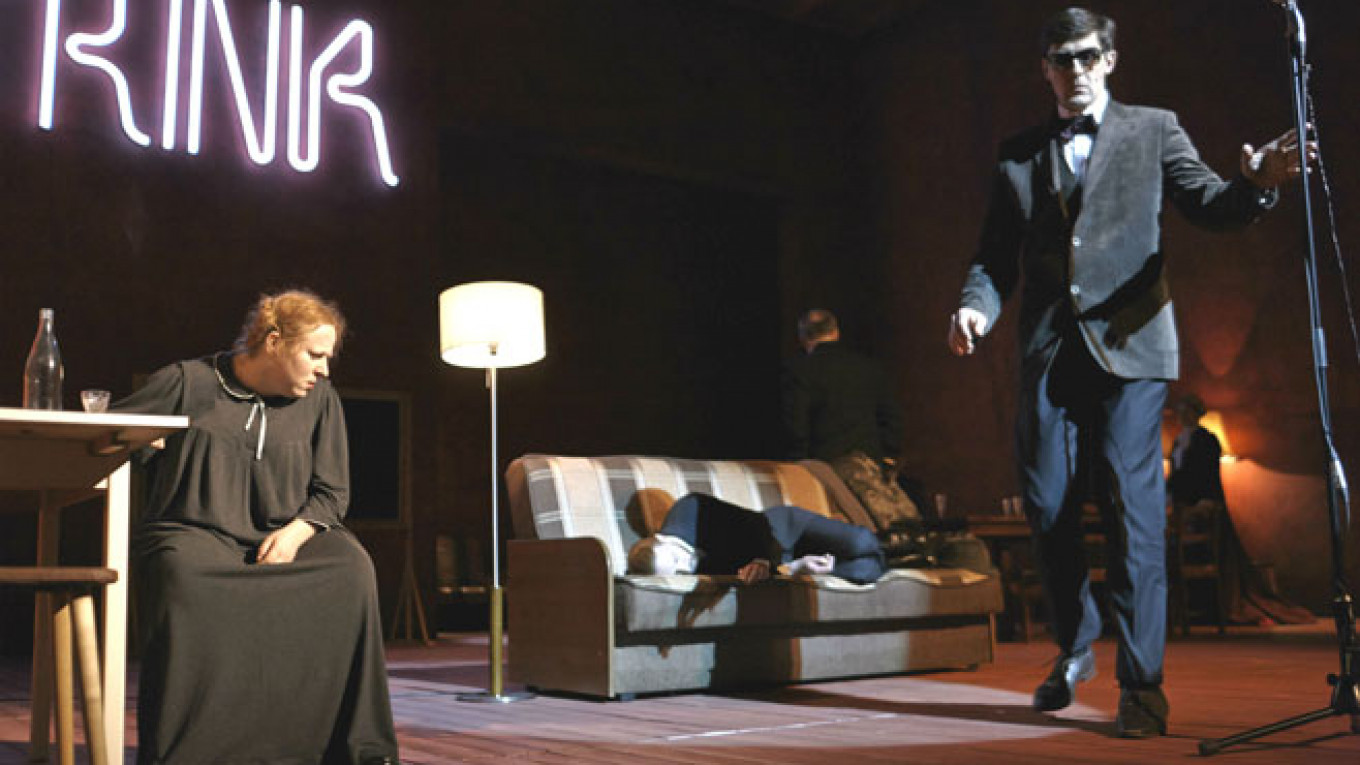Konstantin Bogomolov has grabbed the position of Moscow's most popular director in recent years with a stream of controversial, flamboyant productions, mostly at the Chekhov Moscow Art Theater. His latest outing, a typically audacious dramatization of Francois Rabelais' "Gargantua and Pantagruel," was mounted at the Theater of Nations.
The premiere of "Gargantua and Pantagruel" comes at an opportune time, if that is the proper word. Authorities are increasingly putting pressure on the arts, seeking to influence not only content but form. The most famous of the moves is the law banning all obscenities from stage and screen. Bogomolov avoids the use of direct expletives throughout his performance, but he piles on words, situations and activities that will undoubtedly offend many.
If, for example, you are insulted by the notion of farting, breaking wind, cutting the cheese or anal acoustics, you may have issues with Bogomolov's new show. To say nothing about defecating, copulating and singing vaginas.
You can almost feel Bogomolov and his actors taunting, or at least testing the patience of, the authorities during a scene when a lion is encouraged to clean out an old woman's reeking orifices with his tail. An actor stands over an actress lying on the stage making farting sounds and humps the air over her for what seems to be a period of time that will never end.
Not one obscenity is uttered, however. What are they going to do about that?
So, yes, this "Gargantua and Pantagruel" takes seriously its mission as a poke in the eye of public taste. Does it, however, do anything else?
I found that question harder to answer.
Nothing much happens in the three-hour running time. Actors come out and take up positions standing before microphones or sitting on sofas, and talk.
The main talker is Sergei Yepishev in the role of blind Homer, the teller of the tale. He is joined by Viktor Verzhbitsky, who starts out playing the elder Gargantua, but usually plays the son Pantagruel. Darya Moroz plays Pantagruel's mother and a host of other roles. Roza Khairulina takes on several abstract roles, such as "despair" and "darkness," allowing for some humorous puns when Homer declares that "despair had come" or "darkness did leave."
Sergei Chonishvili usually plays Pantagruel's sidekick Panurge, but doubles as Gargantua when needed.
In short, the details are fluid and they are intended to be. There is no effort truly to tell the story of Pantagruel's travels or travails. Instead this show is a vessel into which a heap of human habits is thrown. They then are pulled out one by one to be put on display. Thus, the cleaning of the old woman's orifices, a few clumsy efforts at courtship, and an exalted trip to a cathedral.
Much of the text is comprised of lists, some lasting several minutes in recitation. We learn all the gory details of Pantagruel's ravenous food intake, we listen to a discursus on the female sexual organ, followed by a woman singing "Casta Diva" from Bellini's "Norma" with a microphone placed strategically below her waist, we hear a speech about the various means and manners of wiping one's soiled backside.
"There is no point wiping if there is no poop," Pantagruel informs us in a kind of scholarly fashion. "You must poop first then wipe."
We are encouraged to consider the same kind of blunt wisdom during a dreamworld tete-a-tete that Pantagruel shares with his long-dead mother.
"You have grown older," she tells him. "Because I am alive, mama," he responds.
Larisa Lomakina set the action in a huge, open, high-ceilinged room surrounded by rust-red walls. Sofas, arm chairs, tables, lamps and other contemporary accoutrements place the characters in an environment that we recognize as our own. Almost constant medieval mood music is broken up at times by opera arias, bard songs or Russian pop tunes, deejayed by Homer.
"Gargantua and Pantagruel" proceeds at a leisurely, melancholic pace. Whether or not it actually arrives anywhere, each spectator will determine for him or herself. Personally, I was well primed for a night's sleep by the time I hit the street.
"Gargantua and Pantagruel" plays June 15 and 16 at 7 p.m. at the Theater of Nations, located at 3 Petrovsky Pereulok. Metro Chekhovskaya. Tel. 495-629-3739. theatreofnations.ru. Running time: 3 hours, 5 minutes.
Contact the author at [email protected]
A Message from The Moscow Times:
Dear readers,
We are facing unprecedented challenges. Russia's Prosecutor General's Office has designated The Moscow Times as an "undesirable" organization, criminalizing our work and putting our staff at risk of prosecution. This follows our earlier unjust labeling as a "foreign agent."
These actions are direct attempts to silence independent journalism in Russia. The authorities claim our work "discredits the decisions of the Russian leadership." We see things differently: we strive to provide accurate, unbiased reporting on Russia.
We, the journalists of The Moscow Times, refuse to be silenced. But to continue our work, we need your help.
Your support, no matter how small, makes a world of difference. If you can, please support us monthly starting from just $2. It's quick to set up, and every contribution makes a significant impact.
By supporting The Moscow Times, you're defending open, independent journalism in the face of repression. Thank you for standing with us.
Remind me later.


